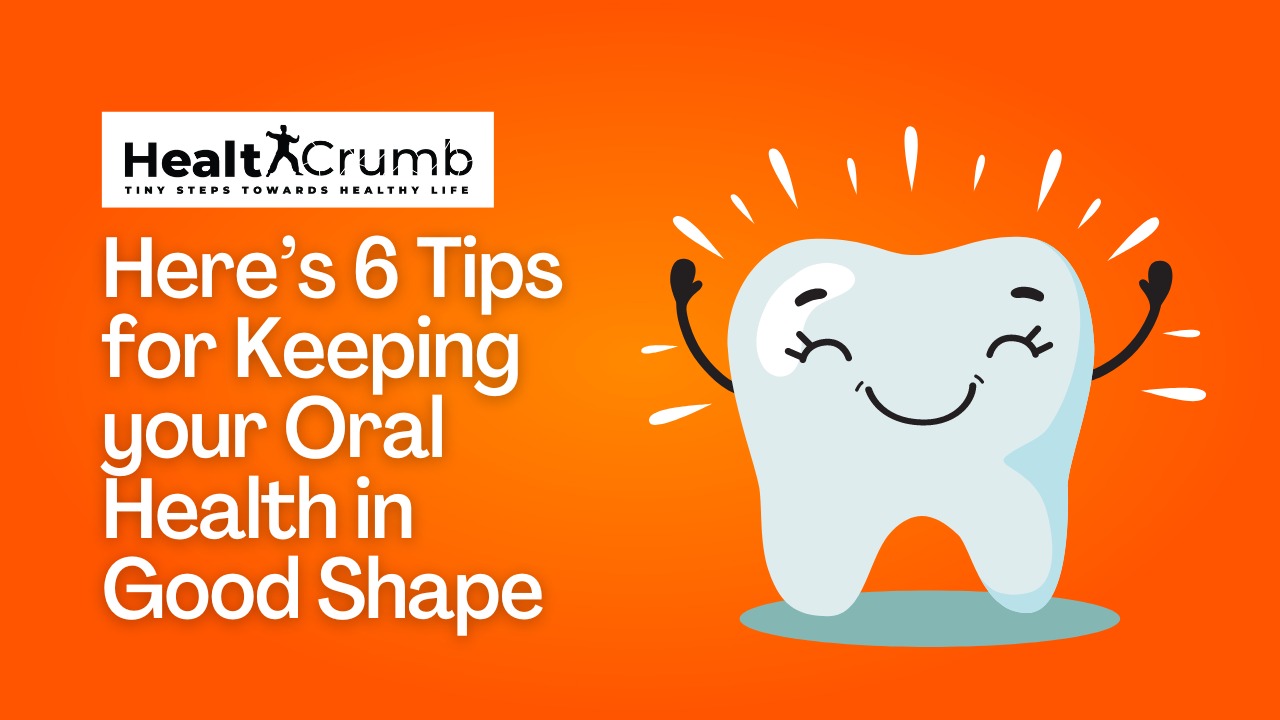We all know that we should be brushing our teeth twice a day and flossing regularly, but what else can we do to keep our oral health in good shape? In this blog post, we will explore six tips for oral health for its good shape. From choosing the right toothbrush to avoiding sugary drinks, read on for some helpful tips!
Why Keeping Oral Health Good is Necessary?
There are a few key reasons why keeping your oral health in good shape is important.
- First, healthy teeth and gums make it easier to eat and speak properly. When your teeth and gums are unhealthy, it can cause pain and difficulty chewing and speaking.
- Additionally, good oral health is important for overall health; studies have linked poor oral health to heart disease, stroke, diabetes, and more.
- Finally, keeping your smile bright and healthy can improve your self-confidence and make you feel good about yourself!
6 Tips for Oral Health
There are many things you can do to keep your oral health good. Here are some tips for oral health to keep it in good shape:
1. Brush your teeth twice a day with a fluoride toothpaste.
2. Floss daily.
3. Eat a balanced diet and avoid sugary snacks.
4. Visit your dentist regularly for checkups and cleanings.
5. If you smoke, quit smoking as soon as possible. Smoking is one of the leading causes of gum disease and other oral health problems.
1. Brushing your teeth
It’s important to brush your teeth at least twice a day to remove plaque and bacteria. Plaque is a sticky film of food debris, bacteria, and saliva. If plaque isn’t removed, it can harden and turn into tartar, which can lead to gum disease.
To brush your teeth effectively:
- Use a soft-bristled toothbrush and toothpaste with fluoride.
- Angle the toothbrush toward the gum line and use gentle circular motions.
- Be sure to brush on the inside surfaces of your teeth and to use a light back-and-forth motion on chewing surfaces.
- Spit out the toothpaste after brushing.
2. Eating healthy foods
When it comes to maintaining good oral health, what you eat plays a big role. Eating a healthy diet is important for keeping your teeth and gums healthy, and can also help prevent bad breath.
It’s no secret that what you eat affects your teeth and gums. Eating healthy foods helps keep your mouth healthy, just like the rest of your body.
Here are some tips for eating healthy and keeping your oral health in good shape:
- Eat plenty of fruits and vegetables. Fruits and vegetables are packed with vitamins and minerals that are good for your overall health, including your oral health. They also help keep your mouth hydrated. This will help ensure that you’re getting all the nutrients you need for good oral health.
- Choose lean protein sources. Lean proteins are good for your teeth and gums because they help promote saliva production. Saliva is important for keeping your mouth clean and preventing tooth decay.
- Limit sugary and acidic foods. Sugary and acidic foods can damage your teeth and lead to cavities. If you do eat these types of foods, be sure to brush your teeth afterwards to remove the sugar and acids from your mouth.
- Drink plenty of water. Water is essential for keeping your mouth hydrated, which helps prevent gum disease. It’s also a great way to rinse away food debris after eating.
- Eat crunchy fruits and vegetables like apples, celery, and carrots. They help clean your teeth as you eat them and promote saliva production, which helps keep your mouth healthy.
3. Avoiding sugary drinks
Sugary drinks are one of the worst things you can do for your oral health. They contribute to tooth decay and can lead to other problems like gum disease.
When it comes to oral health, sugary drinks are one of the worst offenders. Not only do they contribute to tooth decay, but they can also cause gum disease.
To avoid these problems, it’s best to limit your intake of sugary drinks. Water is always the best choice for your teeth and overall health, but if you do choose to drink a sugary beverage, be sure to brush your teeth afterwards.
There are a few things you can do to avoid sugary drinks:
- Drink water instead of sugary drinks. Water is the best thing for your oral health, so drink it as often as you can.
- Choose sugar-free alternatives when possible. There are many sugar-free options available now, so there’s no need to indulge in sugary drinks if you don’t want to.
- Limit your intake of sugary drinks. If you do choose to have a sugary drink, make sure it’s only occasionally and limit yourself to one or two per day.
- Brush your teeth after having sugary drinks. This will help remove any residual sugar from your teeth and help prevent tooth decay.
4. Quitting smoking
Smoking is one of the worst things you can do for your oral health. It increases your risk for gum disease, tooth decay, and oral cancer. If you smoke, quitting is the best thing you can do for your oral health.
If you’re a smoker, quitting is the best thing you can do for your oral health. Smoking stains your teeth, increases your risk of gum disease, and can even cause cancer.
If you’re ready to quit, there are a few things you can do to make the process easier.
- Talk to your doctor about quitting aids like nicotine patches or gum.
- Set a quit date and tell your friends and family about it, so they can support you.
- Plan ahead for situations where you might be tempted to smoke, such as when you’re drinking alcohol or feeling stressed.
- Replace smoking with another activity, such as chewing gum or taking a walk.
Quitting smoking is hard, but it’s worth it for your oral health. With a little planning and support, you can kick the habit for good.
5. Flossing
Flossing is an important part of oral care. It helps remove plaque and bacteria from teeth and gums. Plaque is a sticky film of food debris, bacteria, and saliva. Bacteria in plaque can cause gum disease and tooth decay.
To floss properly, use about 18 inches (45 cm) of floss. Wrap most of the floss around your middle finger, leaving an inch or two (2.5 to 5 cm) to work with. Wrap the other end around your index finger.
Slide the floss between your teeth using a back-and-forth motion. Curved dental floss picks make it easier to get the floss under the gum line.
Be sure to floss behind your last tooth on each side. Use a clean section of floss as you move from tooth to tooth. Rinse with water or mouthwash when you’re done
6. Visiting the dentist regularly
It’s important to visit the dentist regularly so that they can catch any problems early on. This is because regular check-ups can help to prevent problems from developing, and also allow your dentist to spot any potential problems early on, and can help save you money in the long run and keep your smile looking its best.
The American Dental Association (ADA) recommends that people see a dentist every six months for a professional cleaning and checkup.
However, some people may need to see their dentist more often if they have certain risk factors for oral health problems.
Risk factors for oral health problems include:
- Smoking or using other tobacco products
- Having diabetes
- Having a family history of tooth decay or gum disease
- Wearing braces or having other dental appliances
- Taking medications that cause dry mouth
Ideally, you should visit the dentist every six months for a check-up and cleaning.
However, if you have any concerns or are experiencing any problems with your teeth or gums, then you may need to visit more frequently.
During a regular check-up, your dentist will examine your teeth and gums for any signs of problems. They will also clean your teeth to remove any plaque and tartar build-up. If they spot any issues, they will discuss these with you and develop a treatment plan.
If it’s been awhile since you’ve seen the dentist, then don’t worry – there’s no need to be embarrassed. Simply make an appointment and go along for a check-up. It’s never too late to start taking care of your oral health!
Final Words
Maintaining good oral health is important for overall health and well-being. By following these six tips, you can keep your mouth healthy and avoid potential problems down the road.
Be sure to brush and floss regularly, eat a balanced diet, limit sugary snacks, quit smoking, and see your dentist regularly for cleanings and checkups. With a little effort and with the help of these tips, you can enjoy a lifetime of good oral health.
Your oral health is important for your overall health and well-being. Here are some tips to help you keep your mouth, teeth and gums healthy:
By following these simple tips, you can help ensure that your mouth, teeth and gums stay healthy!



